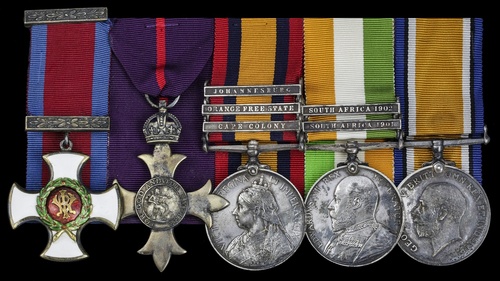
Auction: 19001 - Orders, Decorations and Medals
Lot: 541A
(x) A fine Boer War D.S.O., Great War O.B.E. group of five awarded to Major J. C. Burnett, Royal Artillery
Distinguished Service Order, V.R., silver-gilt and enamel, with integral top riband bar; The Most Excellent Order of the British Empire, O.B.E. (Military) Officer’s 1st type breast badge, silver-gilt (hallmarks for London 1919); Queen's South Africa 1899-1902, 3 clasps (Major J. C. Burnett, D.S.O., R.E.); King's South Africa 1901-02, 2 clasps, South Africa 1901, South Africa 1902 (Capt: J. C. Burnett R.G.A.); British War Medal (Major J. C. Burnett.), centres a little depressed to first, otherwise very fine and better (5)
D.S.O. London Gazette 27 September 1901.
O.B.E. London Gazette 3 June 1919.
John Chaplyn Burnett was born at Alton, Hampshire in December 1863 and educated at Epsom College and the Royal Military Academy, Woolwich. Commissioned into the Royal Artillery in 1884, he was serving as a Captain at the outbreak of the Boer War. Serving initially in the Pom-Pom section, he would later be posted as a Staff Officer at the Dynamite Factory at Middlefontein. Having seen action in the Transvaal, May-June 1900, and east of Pretoria, July-November 1900. He finished the war on the Zululand frontier. The Grantham Journal in an obituary notice gives further detail on one enagement of particular note:
'At Witport, in 1900, he was in command of the Eastern Hills, with Major Munn in command of the Western. The Boers started shelling early morning and a message had to be dispatched calling for help, which was not sent untill dusk. Captain Burnett kept off the Boers all day, although the position on the Eastern Hills was constantly assailed. With a Vickers Maxim the foe was kept at bay, and when the gun could no longer fire, the locks were removed to a place of safety. The gun and carriage bore the marks of 14 bullets at the conclusion of the action.'
Besides the award of his D.S.O., which was presented by the King at Buckingham Palace on 18 December 1902, Burnett was advanced Major, 1 October 1902 and mentioned in the despatches (London Gazette, 10 September 1901, refers).
Having retired in 1909, he was residing in Khartoum, Sudan at the outbreak of the Great War and was re-engaged, '...where he undertook the training of the Camel Corps.'
Invalided home later that year, he served in the Ministry of Munitions as Safety Service Officer based at Leeds. In this position he '...was awarded the O.B.E., was was whilst engaged on this work that on one occasion he missed death through explosion by a few seconds.' (Sole entitlement to the B.W.M. confirmed)
Retired for a second time, Burnett relocated to Barkston, Lincolnshire and became a published mathmetician - indeed 13 Volumes of his work are in the library of University College, London (MS ADD 108, refers). Appointed to the Command of the Barkston Home Guard at the outbreak of the Second World War, he died in the summer of 1943; sold with copied research.
Subject to 5% tax on Hammer Price in addition to 20% VAT on Buyer’s Premium. For more information please view Terms and Conditions for Buyers.
Sold for
£1,600




